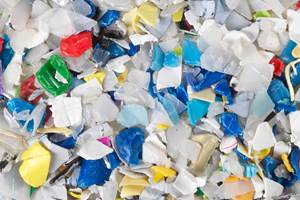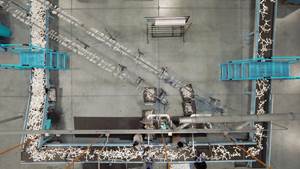U.S. Plastic Bottle Recycling Reaches 3 Billion Pounds
Single-stream collection of household recyclables continues to grow, resulting in higher participation rates.
Plastic bottle recycling grew 97 million pounds in 2014 to top 3 billion pounds for the year, according to figures released jointly by the Association of Plastic Recyclers (APR) and the American Chemistry Council (ACC). The recycling rate for plastic bottles climbed 1% to 31.8% for the year.
Trends in plastics recycling highlighted in the 25th annual National Post-Consumer Plastics Bottle Recycling Report include:
- Single-stream collection of household recyclables continues to grow, resulting in higher participation rates
- Use of plastic bottles in packaging applications is expanding but offset by continued lightweighting and increased use of concentrates with smaller, lighter bottles
- Lack of access to away-from-home recycling continues to be a barrier to increased collection
During 2014, the collection of high-density polyethylene (HDPE) bottles—a category that includes milk jugs and bottles for household cleaners and detergents—rose to nearly 1.1 billion pounds, a gain of over 62 million pounds from 2013. The recycling rate for HDPE bottles rose to 33.6%.
A higher percentage of all post-consumer plastic bottle material was processed by domestic reclaimers in 2014. Exports of all post-consumer plastic bottles rose slightly (in pounds) but fell to the lowest percentage of exports in six years (21.9%) as the amount of bottles collected increased faster than did exports, according to the report. The drop in exports may reflect the strength of the U.S. dollar and growth in domestic reclamation capacity.
U.S. reclamation capacity for HDPE increased to its highest level ever in 2014. Exports of HDPE bottles rose from 15.6 to 19.7% (218 million pounds) of domestically collected material, and domestic reclaimers processed approximately 951 million pounds of HDPE bottles in 2014.
“The message to American consumers is that plastic bottles are valuable resources even after they’ve been used,” said Steve Alexander, executive director of APR. “Americans generated an estimated $730 million in recycled plastic bottles in 2014. The simple act of recycling helps generate local revenue, supports recycling jobs, and enables us to continue to benefit from these useful resources.”
“This report clearly illustrates 25 years of year-over-year growth in recycling plastic bottles,” added Steve Russell, vice president of plastics for the American Chemistry Council. “Plastics help reduce energy use and conserve resources—and after use, these efficient products and packages are increasingly valued as recycled materials. We’re confident that plastics recycling will continue to grow, and we will continue working to accelerate that growth.”
This year’s survey also found that the collection of polypropylene (PP) bottles jumped 28.3% for the year to reach 79.5 million pounds, as the collection rate sprang to 44.9%. Domestic processing of postconsumer PP bottles grew to 65.3 million pounds. PP bottles deliberately recycled as PP (instead of blended with HDPE) rose from 44.2 million pounds in 2013 to 45.6 million pounds in 2014. Although PP caps, closures and non-bottle containers are widely collected for recycling in the United States, these data are presented in a separate report on recycling non-bottle rigid plastics, which will be released in the coming months.
Together, polyethylene terephthalate (PET) and HDPE bottles continue to make up nearly 97% of the U.S. market for plastic bottles with PP comprising 1.9%, LDPE 0.8% and PVC 0.4%.
Related Content
NPE2024 Wrap-Up: Sustainability Dominates Show Floor News
Across all process types, sustainability was a big theme at NPE2024. But there was plenty to see in automation and artificial intelligence as well.
Read MoreBuilding a Future With Sustainable Compounds
With roots in recycling, Star Plastics produces engineering thermoplastic compounds to meet performance and environmental goals.
Read MoreLooking to Run PCR on a Single Screw? Here’s What to Keep in Mind
Just drop it in and mix it up? Sorry, there’s a lot more to it than that. Here is some of what you need to consider.
Read MoreReversing Logistics for Plastic Film Recycling
Learn how Mainetti built a circular supply chain for clear film packaging.
Read MoreRead Next
See Recyclers Close the Loop on Trade Show Production Scrap at NPE2024
A collaboration between show organizer PLASTICS, recycler CPR and size reduction experts WEIMA and Conair recovered and recycled all production scrap at NPE2024.
Read MoreLead the Conversation, Change the Conversation
Coverage of single-use plastics can be both misleading and demoralizing. Here are 10 tips for changing the perception of the plastics industry at your company and in your community.
Read MoreFor PLASTICS' CEO Seaholm, NPE to Shine Light on Sustainability Successes
With advocacy, communication and sustainability as three main pillars, Seaholm leads a trade association to NPE that ‘is more active today than we have ever been.’
Read More






















